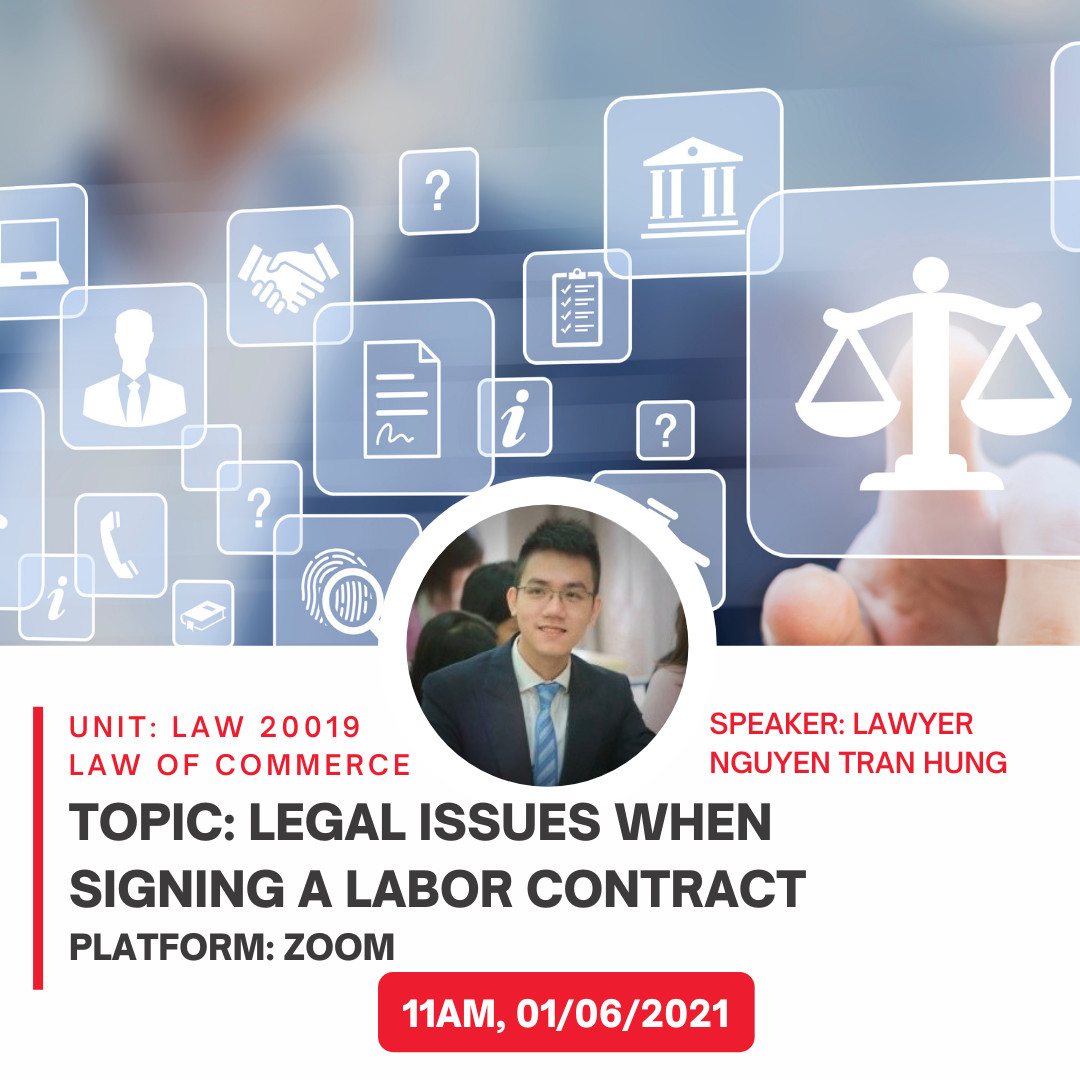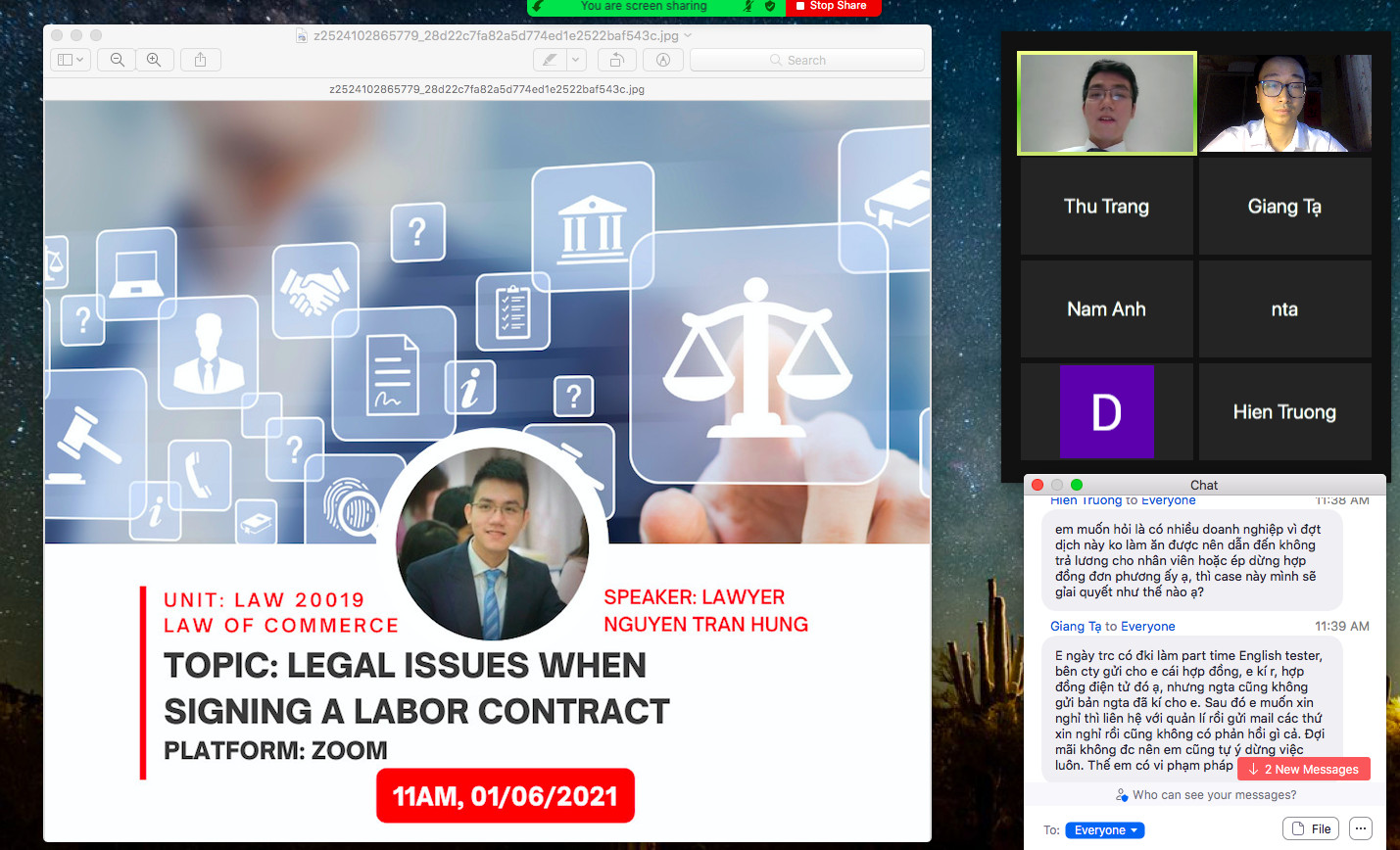What you need to know when signing a labor contract – Tips for students looking for job opportunities
Going to university, many young people look for internships or part-time jobs to gain more experience and earn more. However, many of you have had an unpleasant work experience because of issues related to employee rights. So what knowledge do students need to have when signing a labor contract? Find out through the sharing of lawyer Nguyen Tran Hung and Swinburne Vietnam students at the Industry Link event – Cross-border learning.

Industry Link is a series of activities organized by Swinburne Vietnam to connect students with experts and speakers in the industry. As a result, future interns can have more perspectives on the market context. With the topic “Legal issues when signing an employment contract”, Law of Commerce students had the opportunity to discuss with Lawyer Hung about the terms of employment and how to handle legal disputes.
Understanding the types of contracts and terms to protect employees rights
“Students while still at school should equip themselves with legal thinking and knowledge about their rights and obligations and protect themselves when signing labor contracts,” Law said. Master Hung emphasized. The sharing session lasted for more than an hour, covering various types of contracts, signing forms, rights, and obligations of the parties, and resolving disputes on issues related to labor contracts.
Types of contracts and notes when signing
At this time, the K1 students of Swinburne Vietnam have started their OJT (On-the-Job Training) internship at enterprises, so legal knowledge when signing labor contracts is important, regarding a meaningful and pleasant internship experience.
The most common labor contracts at present are indefinite and fixed-term labor contracts. For students who work as collaborators or freelancers, short-term ones are more popular because businesses will pay based on the short-term work results you provide. One point to note for those of you working in the technology field or creativity is the provision of intellectual property rights. Commonly, products formed with the company resources and during the working time will be considered the business property. Therefore, if you want to protect your ideas or intellectual property, you need to have another agreement on intellectual property rights with your employer.

When signing a labor contract, pay attention to the terms of Intellectual Property Rights if you want to own your ideas or intellectual products (Image: VCCI).
Sometimes, employees face a dilemma, such as receiving a job offer from an interviewer, yet, it was canceled when they accepted the job, as the senior management did not approve the recruitment request. To avoid such a situation, you should wait for human resources to send an official offer letter. Sometimes, your interviewer may not have enough authority to approve the recruitment and sign a labor contract with you. After agreeing to the offer letter to accept the terms of the job, you still need to sign an employment contract to ensure your rights and obligations.
What to pay attention to when negotiating salary?
During the interview process, you will be informed of your salary according to one of two options: gross or net salary. The total income is gross salary, including basic salary and allowances, allowances, etc., including insurance contributions and personal income tax (PIT). Net salary is the amount the employee receives after deducting all insurance costs and personal income tax.

Khi thương lượng về lương, bạn cần chú ý về con số được offer là lương net hay lương gross (Ảnh: Employer Brand News)
Many businesses will convince you to sign a contract with a lower salary than you will receive to reduce the payment of insurance premiums. With this form, your actual monthly income (net salary) may be higher. On the contrary, the higher the insurance premium paid by the business, the more benefits the employees will be guaranteed in cases such as unemployment, maternity leave, etc. Therefore, you should understand the nature of the offers so you can make decisions that fit your needs.
When there is a dispute, what should employees do?
In the process of working, disputes over rights and responsibilities to comply with labor contracts are common. Debt from the company, sudden dismissal, unreasonable penalty/deduction, and harassment at work are common disputes. Theoretically, if the employee gathers enough proof, proving the violation of the contract and labor law from the company, he can sue to reclaim his rights. However, in reality, the lawsuit procedure is quite complicated and time-consuming. Therefore, if it is possible, employees should choose to communicate with their employers and mediate internally if a dispute arises.

Khi có xảy ra tranh chấp, chúng ta nên ưu tiên hòa giải nhưng không nên im lặng.
From his professional and personal experience, lawyer Hung advises students: “Do not be silent. Please communicate clearly, by email or suggestion letter with the business when there is a dispute. This both shows your goodwill to want to improve, and benefits you during mediation or testifying in court.”
Epilogue

After Mr. Hung’s sharing session, Business students have more practical perspectives on labor law in Vietnam.
After Mr. Hung’s sharing session, Business students have more practical perspectives on labor law in Vietnam, and more importantly, lessons to protect their interests. Business networking events, such as these Industry Link lessons from Swinburne Vietnam, aim at “Bringing success to learners” and preparing a solid foundation for students to experience their lives confidently.



